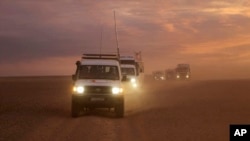Internally displaced people at Rukban refugee camp in southeastern Syria are rejecting a claim by Russia and the Syrian regime that they are being used as human shields by the U.S. troops near al-Tanf military base.
Rukban refugee camp is located in a remote area in Syria's Homs governorate, near the strategic joint border with Jordan and Iraq. The makeshift camp is home to nearly 60,000 Syrians displaced from different areas of the country since the escalation of the country's civil war in 2014. About 16 kilometers from Rukban is a U.S. military base hosting about 200 American soldiers.
"The refugees in Rukban camp are suffering because of the Russian siege," Omar al-Homsi, a spokesperson for Rukban camp, told VOA.
Reiterating a statement from Rukban camp's political committee last week, al-Homsi accused the Syrian government and the Russian military of "trying to force refugees to evacuate the camp by preventing aid from going inside the camp."
The camp's political committee said several infants have died recently due to deteriorating health conditions at the camp.
Women and children
The United Nations refugee agency estimates about 80 percent of the Syrians settled there are women and children, many suffering from fatal diseases, and lack of food and basic services. The U.N. said it is ready to send aid trucks across the border from the Jordanian side to the camp, but said it has failed to obtain permission from the Syrian government in a timely manner.
The Syrian government and Russian military say delivering aid to the camp has been delayed mainly due to lack of security guarantees for relief workers entering the U.S.-controlled area.
Russian and Syrian government refugee coordination centers last week blamed U.S. forces for allegedly detaining the displaced Syrians in the camp. The centers claimed about 95 percent of the displaced people want to return to their homes due to poor conditions at the camp and the de-escalation of violence in other parts of Syria.
Rukban camp spokesman Al-Homsi told VOA that many frightened refugees wished to resettle in rebel-held areas in the north, but doing so was difficult because the Syrian forces are not willing to provide them a safe passage.
He said the Syrian government and the Russian military were embargoing the camp to force the refugees into reconciliation and to pressure U.S. troops to leave the nearby military base.
"Many people resorted to this desert area near al-Tanf base because they wanted to be protected from Russian and Syrian airstrikes," al-Homsi said.
Forced conscription
According to the U.K.-based Syrian Observatory for Human Rights (SOHR), many refugees in the camp fear arrest and forced conscription if they return to their homes in areas controlled by the government.
"There were Russian promises to the refugees who don't oppose (the) Bashar Assad regime to return back to their cities and villages without being arrested," Rami Abdulrahman, head of the observatory, told VOA. "But the refugees do not believe these promises because there were cases in the past when a number of refugees were arrested after they left Rukban camp."
The refugee camp, along with the U.S. base, falls within al-Tanf's 55-kilometer exclusion zone established in 2016 as part of the U.S.-backed coalition's effort to fight the so-called Islamic State (IS) in Syria.
The main rebel group in the area, Revolutionary Commando Army, currently maintains the security of the camp and provides safe passage to aid convoys. The group's fighters have for years protected the area from IS infiltration and Syrian regime attacks.
Maher Sulaiman al-Isa, a representative of the U.S.-backed group, told VOA that Russia and the Syrian regime are attempting to forcefully evacuate people from refugee camps and return them to their homes to demonstrate to the outside world that the war-torn country is going back to normalcy under the regime.
He said the embargo on the camp has tainted Syria's claim for a new beginning and its promises of a major reconstruction process.
"Russians are trying to get rid of the embarrassment that these camps are neglected by the Syrian regime," al-Isa told VOA "They are relentlessly asking the Syrian regime to find a solution for this camp, because it is located inside the Syrian territory."
US protection
Al-Isa said the U.S.-backed rebels in the zone and the refugees in the camp depend on U.S. protection against attacks by the Syrian regime and Iranian militias.
Last December, U.S. President Donald Trump announced the withdrawal of 2,000 U.S. troops from Syria after IS is defeated. However, Trump in February decided to keep about 400 U.S. troops in Syria, 200 of these troops allegedly will be stationed in al-Tanf.
Al-Isa said the base's strategic location, which prevents Iran from gaining access to the Iraq-Syria-Jordan tri-border, in addition to humanitarian considerations, will likely encourage the U.S. to keep troops there for a while.
"We know that there is a debate around the withdrawal from al-Tanf, especially among the U.S. generals, and this is for strategic reasons to face the Iranian plans," al-Isa said, adding, "The withdrawal will be delayed from al-Tanf base for an indefinite time."
Displaced Syrians Deny Claims that US Detains Them in Al-Tanf Camp
- By Nisan Ahmado
